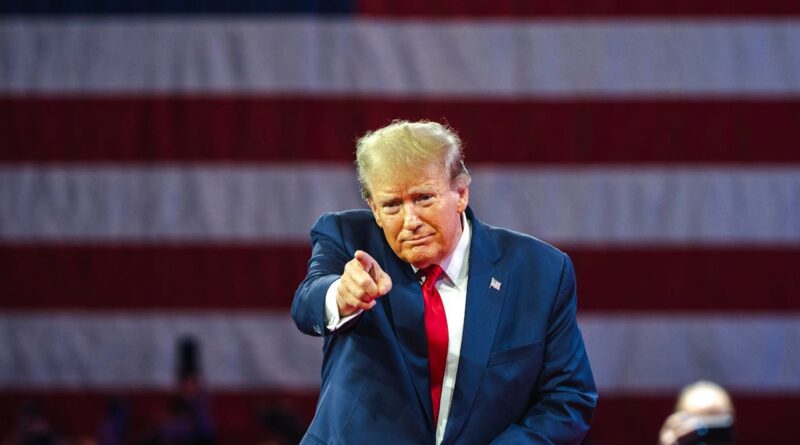What the Trump presidency will mean for the European economy
After the victory of Donald Trump in the American presidential elections, Europe must now prepare for a new era of economic protection. Trump’s policies during his second term will undoubtedly have major impacts on the continent’s economy, environmental sustainability and development dealing with climate change, and may threaten the future of globalization themselves.
Prices are very high in Europe. After decades of political and cultural cooperation, the European Union and the US have the largest trade and investment relations in the world, which, in 2021, will reach €1.2 trillion.
Charges, China and collateral damage
The immediate economic concern for Europe will be tariffs. Trump has floated the idea of rolling back the federal income tax at rates ranging from 10% to 20%. Higher tariffs will affect Europe directly and indirectly.
The direct impact will be higher tariffs on European goods in all categories, from steel and cars to cheese and wine, with the aim of making them uncompetitive with US markets.
Although the tariffs are not aimed directly at European goods, European companies could still be hurt if the US decides to apply sanctions to products that use Chinese parts or technology, or pressure Europe to disengage from China. .
The European economy is closely linked to global value chains, and China is its second largest trading partner for goods after the US – bilateral trade between the EU and China will reach €739 billion in 2023.
Europe’s biggest imports from China are telecommunications equipment, electrical machinery and equipment, and data automation equipment. Its main products are cars and trucks, medicines and other machines. These are all important sectors, and if they are blocked or cut off, it will be very damaging to the European economy. US efforts to slow down China’s economic and technological progress could therefore cause significant damage to Europe.
Speaking at the IESE Madrid campus in June, Nobel laureate Joseph Stiglitz noted that it is difficult for Europeans to understand the deep, bipartisan “paranoia” that the US feels about China. In his words, “it’s a very big part of the US thinking because it’s both parties, and it’s very focused on the economy.”
Read more: What Trump’s victory means for Ukraine, the Middle East, China and the rest of the world
Geopolitics and the cost of defense
While Biden’s foreign policy has been described by his Secretary of State Anthony Blinken as “values-based negotiation”, Trump will likely choose Michael Pompeo, or another Republican with a similar position. it will also put its understanding of US interests front and center.
For Europe, this could mean a significant reduction in US support for the Ukrainian government, as well as renewed pressure on the North Atlantic Treaty Organization (NATO) – the US still provides less than 70% of the NATO budget.
This process, of course, will take time, but it will force European countries to make decisions about security. One option would be to significantly increase spending for Ukraine and NATO, which would affect already tight budgets across the continent.
The United Kingdom and northern EU countries are likely to support a high-spending defense strategy to keep Russia’s interests at bay, but other EU countries, such as Hungary, are unlikely. of returning a strong increase.
Without strong support from Europe, Ukraine may have no choice but to negotiate some kind of ceasefire or deal that gives Crimea and its other eastern provinces to Russia. The danger is that, in the long and long term, Russia may see a partial victory in Ukraine as a green light for further expansion in Moldova, and possibly the Baltic states.
Read more: NATO-proofing NATO: why Europe’s nuclear deterrent may not be enough to face the biggest threats since WWII
Questions about inflation and climate change
Another big economic question for Europe will be the future of the administration of Biden’s 2022 Inflation Reduction Act (IRA), the biggest environmental law in American history. For many European governments, the IRA clearly violates the rules of international trade of the World Trade Organization, and provides incentives for investments that would otherwise have gone to Europe.
While Trump has said he opposes the IRA and does not believe in climate change, most of the IRA’s funding has gone to Republican-controlled countries and will be difficult to isolate. At the same time, Trump has made it clear that he will liberalize the development of fossil fuels and withdraw the United States from the Paris climate agreement.
US intransigence on environmental issues will strengthen opposition to Europe’s transition to a low-carbon economy. It is possible that Europe’s pursuit of energy independence and the will of European citizens will be enough to save energy, but the critics of green policies will be tough, especially in terms of costs.
Read more: US election: Trump threatens to roll back US environmental laws and reverse climate progress
The future of globalization is at stake
Perhaps the biggest danger of the Trump administration is the future of globalization itself. As the latest meeting of the BRICS countries in Kazan, Russia made it clear that several countries around the world want to change the structure of the international system that the world has enjoyed for the last 60 years.
It will take more than four years of protectionist policies in the United States to undo global supply chains and long-standing business practices. However, this second Trump administration may show a change, and he may be succeeded by another Republican who continues on the same path.
Given time, we may see the end of globalization as we know it, and the emergence of two or three trade blocs around the world surrounded by high tariffs, political tensions, and different political and philosophies.
#Trump #presidency #European #economy
